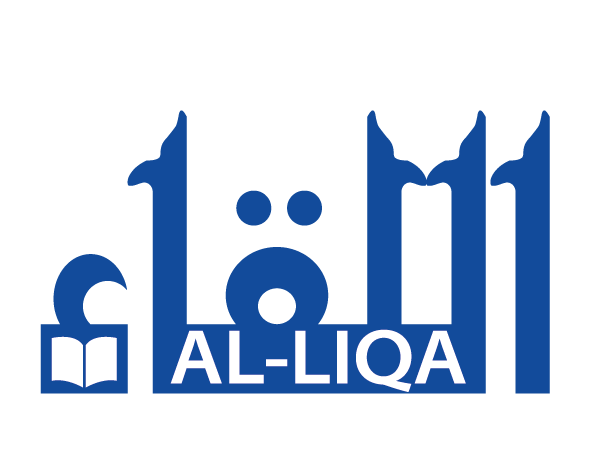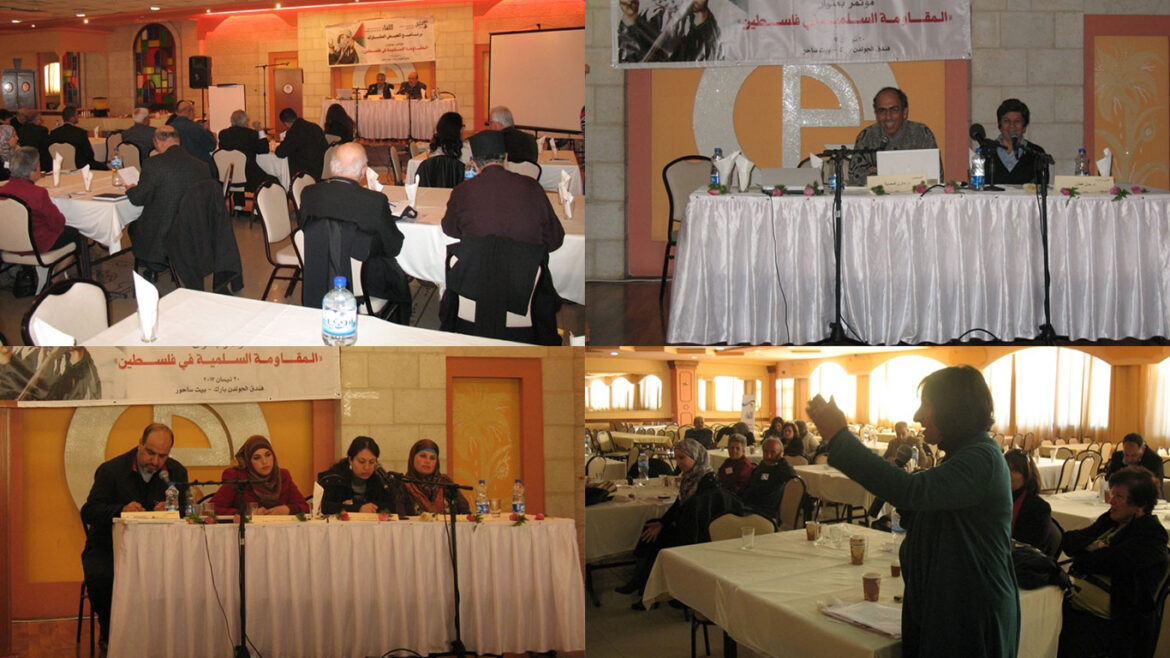Dr. Geries S. Khoury of Al-Liqa’ and Attorney Jonathan Kuttab of Sabeel Center welcomed those participating in the Conference. Both stressed that our belief in peaceful resistance is not a result of weakness, and fear of the usurpers and Israeli occupiers, but rather a strength in our strong belief in the just cause of the Palestinian Problem while putting forth a word of truth without any distortion to both Israeli and international societies concerning our daily worries. Our sole demand is to live in dignity and liberty in a Palestinian state and on Palestinian soil with East Arab Jerusalem as its capital; and of course in peace with the Israelis.
The first lecture was moderated by Mr. Mousa Darwish of Al-Liqa’. The lecturer H. B. Patriarch Michael Sabbah focused on Palestinian Christian view of peaceful resistance and pointed out that peaceful resistance comprises several issues such as peace, violence, war, terrorism, and the various religions points of views on war and on peace …, the peaceful resistance which was also aborted in the name of Christianity or Islam. His B. said that we need to clarify the message that God implored us to do and not to kill in the name of Allah. Patriarch Sabbah mentioned the importance of the revealed passages in the Holy Books on peace and love; and he added that the basic issue is the resistance to evil and sin. He mentioned some basic sources from such as what Rev. Dr. Na’im ‘Ateek wrote in his books, Sabeel Center, what Dr. Geries S. Khoury in his book “ The Intifada of Heaven and the Intifada of Earth”, Al-Liqa’ Center, and what Rev. Dr. Mitri Raheb wrote and others about non-violent resistance in Palestine from a Christian view. He also mentioned the document Kairos Palestine- “A moment of Truth” which clearly indicates Palestinian Christian view of non-violent resistance.
Following Patriarch Sabbah, Sheikf Zuheir Al-Dab’i’s lecture focused on “Palestinian Islamic view of peaceful resistance”. He pointed out that military resistance which generations of our people espoused led to negative results. Instead, non-violent resistance that many generations also practiced led to our steadfastness. This is the strongest reply to the Zionist and Israeli occupation program. This lecture was moderated by Mrs. Haneen Abu Sa’da.
Mr. Ziad ‘Izzat followed with a lecture on “Courage in non-violence”, which was moderated by Mrs. Hanadi Soudah Younan. Courage, according to the lecturer, was looked at, according to cultural and philosophical legacy, both ancient and modern with violence and sometimes with non-violence. Courage cannot be cannotated with violence, unless it is used for good. He focused as well on a comparison between violence and non-violence.
Following a one hour lunch break, a lecture by Ms. Ta’yeed Al-Dab’i focused on a comparative analysis of the Stone Uprising of 1987 and Al-Aqsa Uprising of 2000. The Lecture was moderated by Dr. Adnan Musallam of Al-Liqa’. Ms. Ta’yeed stresssed in this comparison on the positive results of the Stone Uprising while pointing out the negative results of Al-Aqsa Uprising.
Ms. Al-Dab’i lectured was followed by a panel comprising three speakers: Ms Raja’ Abu Rahmeh from Bil’in, Ms. Manal Al-Tamimi from Al-Nabi Saleh, and Fr. Dr. Ibrahim Shomali from Beit Jala. Each participant focused on weekly non-violent activities in his/her area in light of Israeli colonial settlement activities including the separation wall.
Dr. Mazen Qumsieh presented in his lecture models of peaceful resistance in Palestine and how to transform these models into a nationalist movement. Public opinion polls clearly indicate that the majority of Palestinians support all kinds of resistance and not only armed or peaceful resistance. Dr. Jeanne Kattan moderated the lecture.
The study day was concluded with a lecture by Dr. Sami Al-Kilani, which was moderated by Ms. Hind Khoury. Dr. Sami focused on strategy of peaceful resistance in Palestine and spoke of factors hampering or reinforcing non-violence in Palestinian society. Violence against woman reinforces violent thought in society. The lecturer added that popular beliefs are the fertile ground in which violence prospers.
Each presentation was followed by a question and an answer session, all of which enriched the Conference Day. Dr. Geries S. Khoury concluded the day by thanking all, lecturers, and panel members; participants from the Bethlehem Governorate, Nablus, Hebron, Jerusalem, Ramallah and from Galilee. Dr Khoury underlined the fact that the proceedings of the Conference will be published both in Arabic and English. Before departure, all those attending the Conference were invited for dinner.


